Mayo Clinic's approach
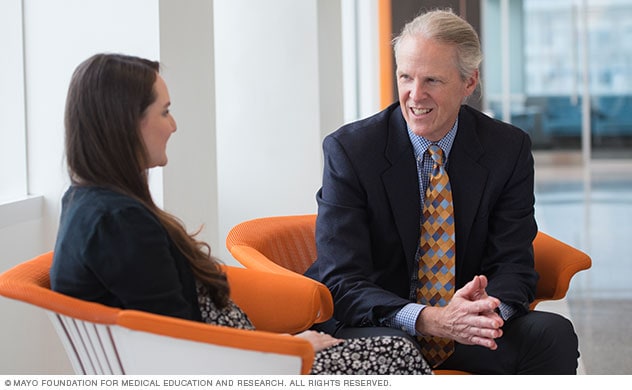 Kidney transplant consultation
Kidney transplant consultation
Kidney transplant consultation at Mayo Clinic
Teamwork
At Mayo Clinic, an integrated team of doctors trained in kidney disease (nephrologists), abdominal transplant surgery, infectious disease management and other specialties is focused on the needs of you and your family. Surgeons, doctors, transplant nurses, pharmacists, social workers and others work together to manage every aspect of your kidney transplant, from planning through postsurgical care.
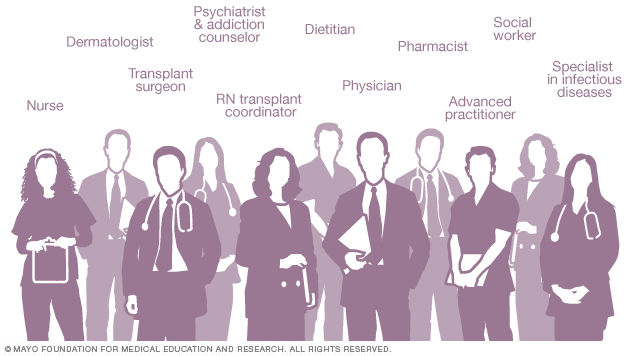 Care team roles
Care team roles
Healthcare professionals trained in many medical specialties work together as a team to ensure favorable outcomes from your kidney transplant.
Coordinated care
Having all of this subspecialized expertise in a single place, focused on you, means that you're not just getting one opinion — your care is discussed among the team, your test results are available quickly, appointments are scheduled in coordination, and your transplant care team works together to determine what's best for you.
Surgical expertise
At Mayo Clinic, surgeons perform more than 650 kidney transplants a year, including numerous complex surgical procedures at campuses in Arizona, Florida and Minnesota. As a three-site institution, Mayo Clinic has one of the largest living-donor kidney transplant and paired kidney donor programs in the United States.
Our experts have pioneered many procedures, including living-donor kidney transplants and kidney transplant before dialysis is needed. The Mayo Clinic kidney transplant team has extensive experience in the most complex types of kidney transplantation, including ABO incompatible, positive crossmatch and paired donation kidney transplants.
Mayo Clinic in Rochester, Minnesota, is ranked as the best hospital in the nation for diabetes and endocrinology by U.S. News & World Report. Mayo Clinic in Phoenix/Scottsdale, Arizona, and Mayo Clinic in Jacksonville, Florida, are ranked among the Best Hospitals for diabetes and endocrinology by U.S. News & World Report.
Pediatric kidney transplant surgery also is provided to children at Mayo Clinic in Rochester, Minnesota, and Phoenix/Scottsdale, Arizona.
Mayo Clinic also offers kidney transplants to select candidates with hepatitis B and C and treated HIV.
Kidney transplant outcomes at Mayo Clinic compare favorably with the national average.
Start your donor evaluation
Begin the process of becoming a living kidney or liver donor by clicking here to complete a health history questionnaire.
Research
Researchers at Mayo Clinic are actively engaged in developing new technologies, treatments and techniques to make transplants safer and available to more people.
Mayo Clinic researchers were part of a major U.S. study that pioneered a new pretransplant immune system treatment to expand the use of incompatible living-donor kidney transplants — an innovation that means less time on dialysis waiting for a perfect match for many people whose immune systems previously wouldn't tolerate a living-donor kidney.
At Mayo Clinic, you may have access to ongoing clinical trials, research and new treatments.
Mayo Clinic researchers actively study medicines and treatments for people with kidney transplants, including new medicines (immunosuppressive medicines) to keep your body from rejecting your kidney transplant.
Researchers also are investigating better ways to lower antibody levels in your blood to reduce rejection of a donor kidney and improve outcomes when the match between a donor and recipient isn't ideal (ABO incompatible and positive crossmatch kidney transplants).
Other research areas include looking at new ways to use immunosuppressive medicines, including tacrolimus (Prograf, Astagraf XL), sirolimus (Rapamune), belatacept (Nulojix) and steroid-free immunosuppression medicine options, to help reduce side effects and complications for people with kidney transplants.
Read more about the Kidney and Pancreas Transplant Research Program.
Nationally recognized expertise
At Mayo Clinic, surgeons perform more than 650 kidney transplants a year, including numerous complex surgical procedures at campuses in Arizona, Florida and Minnesota. As a three-site institution, Mayo Clinic has one of the largest living-donor kidney transplant and paired kidney donor programs in the United States.
Our experts have pioneered many procedures, including living-donor kidney transplants and kidney transplant before dialysis is needed. The Mayo Clinic kidney transplant team has extensive experience in the most complex types of kidney transplantation, including ABO incompatible, positive crossmatch and paired donation kidney transplants.
Mayo Clinic in Rochester, Minnesota, is ranked as the best hospital in the nation for diabetes and endocrinology by U.S. News & World Report. Mayo Clinic in Phoenix/Scottsdale, Arizona, and Mayo Clinic in Jacksonville, Florida, are ranked among the Best Hospitals for diabetes and endocrinology by U.S. News & World Report.
The Mayo Clinic experience and patient stories
Our patients tell us that the quality of their interactions, our attention to detail and the efficiency of their visits mean health care like they've never experienced. See the stories of satisfied Mayo Clinic patients.

A living legacy: Donors who give hope and healing
Charnel Golis-Tabag stands with sign showing why she donated a kidney When Charnel Golis-Tabag picked up her sister from the airport in her home state of Hawaii, she didn't expect to hear that her sister's kidney function had dropped below 11%. That moment changed everything. "She told me she was on the transplant list," Charnel recalls. "Two days later, I called Mayo Clinic to start the living kidney donation process." Charnel had seen too many…
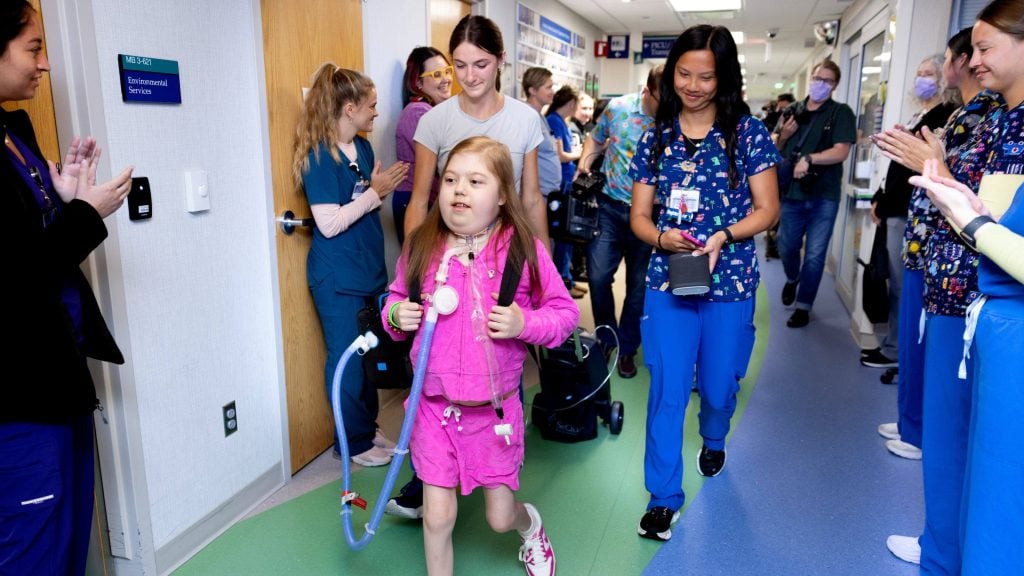
(VIDEO) 13-year-old Ava is home with a new heart, kidney following a 22-month hospital stay
After more than 22 months at Mayo Clinic Children's, 13-year-old Ava Weitl went home to Iowa. She and her family were met with tears and cheers as dozens of members from her care team, who are now considered friends of the family, said goodbye and wished her well. This was a day Ava had been looking forward to after a long journey with heart failure, two lifesaving extracorporeal membrane oxygenation (ECMO) therapies, a heart transplant, kidney…
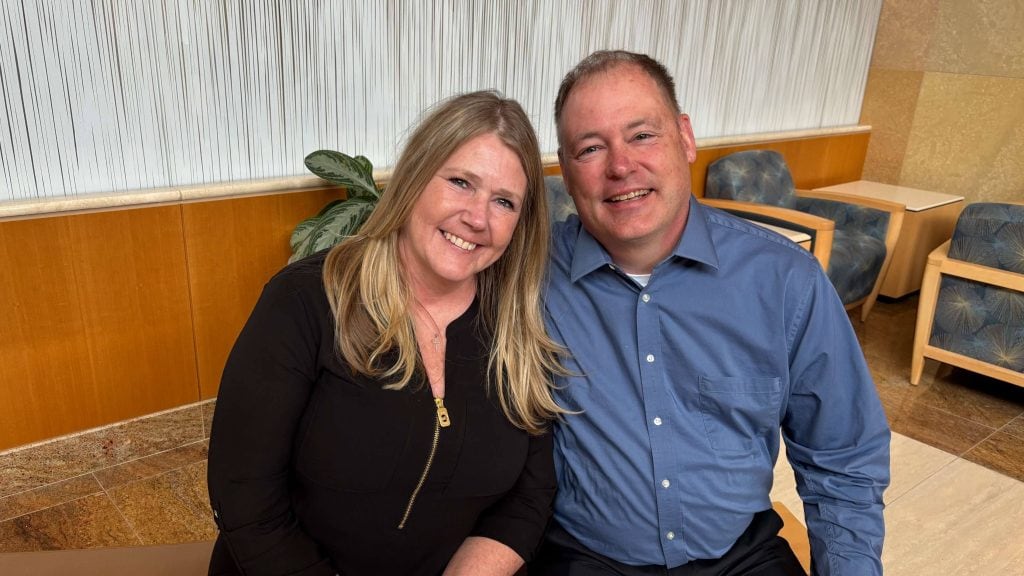
(VIDEO) Eliminating the need for lifelong immunosuppressive medications for transplant patients
Cindy Kendall donated a kidney and stems cells to her brother, Mark Welter ROCHESTER, Minn. — While immunosuppressive medications are critical to prevent rejection of transplant organs, they also come with plenty of downsides. They can cause harsh side effects, like headaches and tremors, and increase the risk for infection and cancer. But what if there was a way to prevent organ rejection without using these medications? That goal fuels the work of Mark Stegall, M.D.,…

Social worker helps patients on transplant 'journey of cautious hope'
When Tiffany Coco steps into a room at Mayo Clinic Transplant Center in Arizona, she focuses on the patient's needs beyond the medical updates. "Often, patients put their best face forward with the physicians," says Coco, "And when they talk to us, they let their guard down and open up about how transplant affects their day-to-day life." As a licensed clinical social worker embedded in multidisciplinary care teams, Coco uses her clinical expertise to assess…
Expertise and rankings
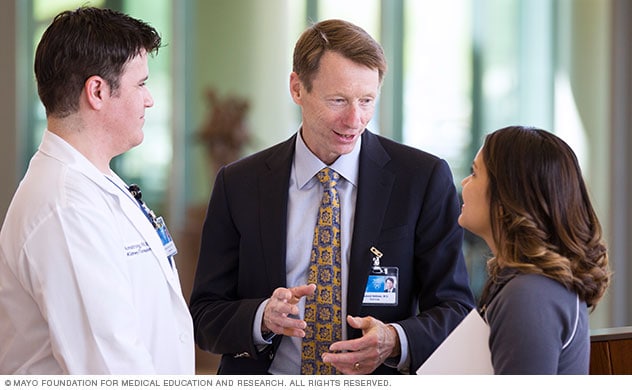 Kidney transplant interdisciplinary team
Kidney transplant interdisciplinary team
Kidney transplant interdisciplinary teamwork at Mayo Clinic
Experience
Mayo Clinic kidney transplant surgeons have performed more than 7,000 procedures using state-of-the-art technology since performing their first kidney transplant in 1963.
At Mayo Clinic, surgeons perform more than 650 kidney transplants a year, including numerous complex surgical procedures at campuses in Arizona, Florida and Minnesota. As a three-site institution, Mayo Clinic has one of the largest living-donor kidney transplant and paired kidney donor programs in the United States.
Our experts have pioneered many procedures, including living-donor kidney transplants and kidney transplant before dialysis is needed. The Mayo Clinic kidney transplant team has extensive experience in the most complex types of kidney transplantation, including ABO incompatible, positive crossmatch and paired donation kidney transplants.
Mayo Clinic in Rochester, Minnesota, is ranked as the best hospital in the nation for diabetes and endocrinology by U.S. News & World Report. Mayo Clinic in Phoenix/Scottsdale, Arizona, and Mayo Clinic in Jacksonville, Florida, are ranked among the Best Hospitals for diabetes and endocrinology by U.S. News & World Report.
Innovation and research
Mayo Clinic transplant researchers take a leading role in efforts to find new, improved ways to conduct all aspects of transplantation. This includes expanding the availability of transplants, reducing risks and improving the outcomes of transplantation.
Our experts have pioneered many procedures, including living-donor kidney transplants and kidney transplant before dialysis is needed.
The Mayo Clinic Transplant Center supports many studies for kidney transplant research.
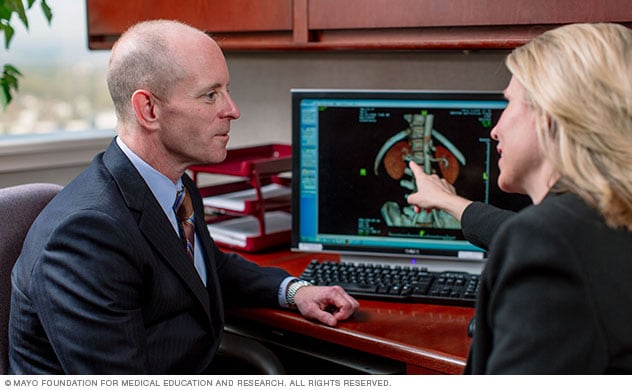 Kidney transplant research at Mayo Clinic
Kidney transplant research at Mayo Clinic
Nationally recognized expertise
Kidney transplant outcomes at Mayo Clinic compare favorably with the national average.
At Mayo Clinic, surgeons perform more than 650 kidney transplants a year, including numerous complex surgical procedures at campuses in Arizona, Florida and Minnesota. As a three-site institution, Mayo Clinic has one of the largest living-donor kidney transplant and paired kidney donor programs in the United States.
Our experts have pioneered many procedures, including living-donor kidney transplants and kidney transplant before dialysis is needed. The Mayo Clinic kidney transplant team has extensive experience in the most complex types of kidney transplantation, including ABO incompatible, positive crossmatch and paired donation kidney transplants.
Mayo Clinic in Rochester, Minnesota, is ranked as the best hospital in the nation for diabetes and endocrinology by U.S. News & World Report. Mayo Clinic in Phoenix/Scottsdale, Arizona, and Mayo Clinic in Jacksonville, Florida, are ranked among the Best Hospitals for diabetes and endocrinology by U.S. News & World Report.
Volumes and outcomes
Mayo Clinic doctors' experience and integrated team approach results in transplant outcomes that compare favorably with national averages. Teams work with transplant recipients before, during and after surgery to ensure the greatest likelihood of superior results.
Volumes and statistics are maintained separately for the three Mayo Clinic locations. Taken together or separately, transplant recipients at Mayo Clinic enjoy excellent results.
Locations, travel and lodging
Mayo Clinic Transplant Center offers care and housing for transplant patients and their families in Arizona, Florida and Minnesota.
Mayo Clinic has major campuses in Phoenix and Scottsdale, Arizona; Jacksonville, Florida; and Rochester, Minnesota. The Mayo Clinic Health System has dozens of locations in several states.
For more information on visiting Mayo Clinic, choose your location below:
Costs and insurance
Kidney transplant costs and insurance information
Mayo Clinic has dedicated transplant financial services representatives and social workers who can assist you with insurance and financial questions regarding your transplant.
Mayo Clinic works with hundreds of insurance companies and is an in-network provider for millions of people. In most cases, Mayo Clinic doesn't require a physician referral. Some insurers require referrals or may have additional requirements for certain medical care. Many insurance companies require you to get preapproval authorization prior to transplant services.
Insurance information
Before your transplant, it's important that you work closely with your insurance company to understand your benefit plan. You'll be responsible for any of your transplant and medical care costs not covered by your insurance company.
You may want to ask your insurance company several questions regarding your transplant expenses, including:
- What is the specific coverage of my plan? What are my deductibles, coinsurance, copayments, lifetime maximum amount and annual maximum amounts for both medical care and transplant services?
- Does my plan have a preexisting or waiting period clause? If so, what is the time frame? Can this be waived?
- Does my plan include pharmacy coverage? If so, will my plan cover my current medicines and immunosuppressant medicines?
- Does my plan require any special approvals for evaluation or transplant? How long does the approval process take once submitted to insurance?
- Does my plan cover my transportation and lodging expenses during my transplant care?
- Does my current insurance require enrollment in Medicare when eligible?
- Does my insurance follow Medicare Coordination of Benefits guidelines?
- How will my current coverage change after enrolling in Medicare? Will my plan become a supplemental or secondary plan?
If your plan is a Medicare supplement, ask questions including:
- Does my plan follow Medicare guidelines?
- Does my plan cover Medicare Parts A and B deductible and coinsurance?
- Does my plan have a preexisting or waiting period clause? If so, what is the time frame?
- Does my plan offer an option for Medicare Part D coverage?
Other expenses
Please plan for other expenses that may occur related to your transplant, which may include follow-up medical appointments, long-term medicines, caregiver expenses, travel, parking, lodging and other expenses.
For international patients
Mayo Clinic has dedicated international patient account representatives who can assist you with questions regarding your costs and insurance. Read more about international financial services.
Case managers
Mayo Clinic financial staff will work closely with your case managers from your insurance company. Your case manager, who is assigned to you, is available to answer questions and calls related to your insurance costs.
Sept. 05, 2025